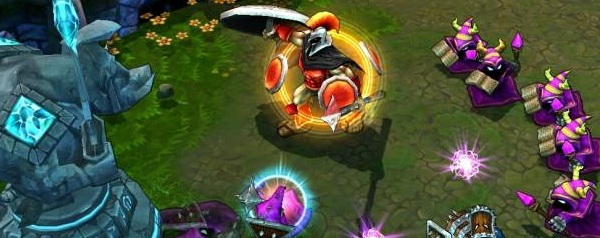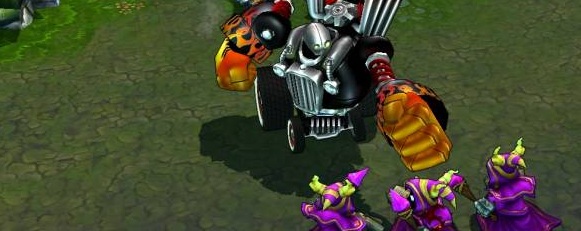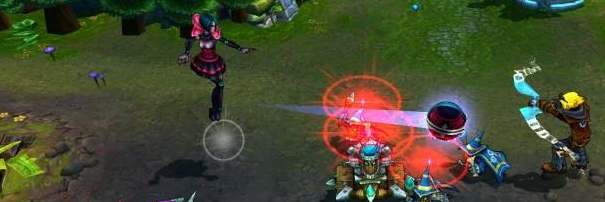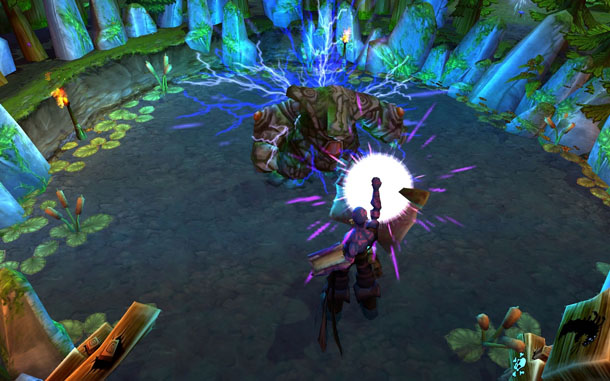Pop culture has always a pretty good barometer of the things that people are worried about. Sci-fi of the 50’s was either about nuclear war or space exploration. The X-Men comics were about racism and have evolved to include other developing civil rights issues such as sexual orientation and identity. The 80’s saw the introduction of the ‘generic terrorist’ action film genre, with a not-so-surprising resurgence in the early 2000’s.
But what happens when contemporary concerns affect not the content, but the fundamental business model of the artifact?
League of Legends happens.

Released in the fall of 2009, League of Legends utilized an interesting and ultimately fateful price point: zero. Amidst the crushing depths of a worldwide economic recession, Riot Games gave away their only title entirely for free. And for the last three years, their powerful combination of infinite value and ‘easy-to-learn-embarrassingly-hard-to-master’ gameplay has not only retained a loyal core following, but grown to be the most played PC game on Earth and an undeniable e-sports powerhouse.
But who would have thought that giving away your product would lead to a $5 million prize pool for a single season of professional play?
Earlier in 2009, the Dungeons & Dragons MMO converted from a conventional subscription model to one in which the game itself was free with stripped down content, with additional quests, classes, and upgrades available for a fee. This transition not only saved the game, but publisher Turbine saw a 500% increase in revenue.
Riot’s scheme for world domination, however, was to give everything away from the start.
Sort of.

In League of Legends, there is no fundamental game content locked away in a vending machine. All of the maps are readily available, and all of the characters and runes (stat-modifiers) can be purchased using credit a player earns by playing (called ‘Influence Points,’ or IP). At any given time, ten characters are freely available to everyone on a rotational basis, and IP or real money can be spent to unlock a character for perpetual use. Runes, interestingly, can only be purchased with IP. The only things that cannot be acquired in any way aside from currency are the cosmetic skins, of which there are many.
When Dali asked what our ‘Game of the Generation’ was, I made a short list in my brain. This list was mostly populated by mainstream, ‘standard’ $60 titles. Bioshock for its solid gameplay, spectacular setting, and twist ending that was as much a commentary on video games as it was about human nature itself. The Assassin’s Creed series – which I’ll admit I do not enjoy playing – injected the hobby with pervasive post-modernism and showed itself to be a game actually about playing video games. Skyrim is huge, you guys, if you hadn’t heard. And Portal 2 has the best robot characters this side of A New Hope.
All those games are fantastic, and all deserve every accolade they have gotten and will get. But when deciding on a game that I feel defines the generation, I can’t ignore the fact that in this global environment of the games business, the business aspect is proving to be as important as the games. And when a game launches with a business model that for years was regarded as silly, ‘casual,’ and doomed for failure not only survives but conquers? I think we should pay attention.

That’s not to say, however, that League of Legends‘ gameplay is not worthy of admiration. Its dominance as a premier e-sports title grows weekly, rivaling that of perennial darling Starcraft II. And despite what you may have heard, the game is very casual-friendly (provided the casual player takes care to avoid the ‘tryhards,’ a breed of gamer who, no one will argue, could use a visit or two to a licensed therapist). A few months ago, Riot also implemented a semi-official match type born from self governed rules called ‘All Random All Mid’ (or ARAM), using the single-lane tutorial map colloquially known as Murder Bridge. This is, of course, highly apropos given the fact that League of Legends is really a legitimized version of a Warcraft III mod, and thus already has emergent gameplay coursing through its veins.
I’ll leave you today with a near-afterthought. With few exceptions, the gaming community has aspired to be taken seriously the adults of the entertainment media in spite of an unfortunately majority perception of childishness. Both of those articles I linked earlier that were about League of Legends? Forbes and ESPN. The adults are paying attention now.
And so I raise a barrel of Gangplank’s finest grog to you, League of Legends, as my Game of the Generation. May all your rivers be warded and none of your Barons be stolen!


No Comments